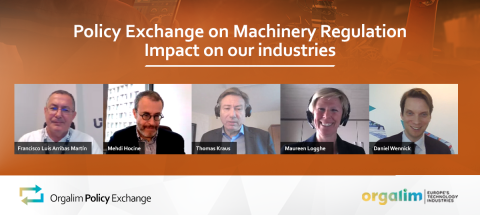Orgalim Policy Exchange: The Machinery Regulation – Impact on our industries
31 March 2023

More than 200 participants joined Orgalim’s Policy Exchange yesterday to hear the latest on the EU Machinery Regulation as it progresses towards implementation. The new Regulation is due to enter into force this July and apply from January 2027, which gives all sides just 42 months to get ready. Our webinar brought together experts from the European Commission, industry, market surveillance authorities and standards bodies to share insights into what to expect and how best to prepare.
With this being such a key piece of legislation for Europe’s technology industries, much is at stake, as Orgalim Policy Director and moderator, Daniel Wennick, emphasised. "It is very important for our industries to have a smooth transition to the new Regulation, to reduce the implementation costs and safeguard competitiveness," he said.
To that end, the discussion focused firstly on the timeline, second on the key changes coming up, and third on what is being done, and needs to be done, to ensure a smooth implementation.
On the timeline, Mehdi Hocine, Head of Unit, Machinery and Equipment, European Commission, DG GROW, pointed out in his keynote address that some provisions of the new Regulation will already kick in before January 2027, while the obligation for Member States to report accident data applies after 24 months. The Commission will update the Guide to application of the Machinery Regulation, but it will be some time before it is available – there is no timeline for it yet, he said. Streamlined safety procedures will apply immediately upon entry into force.
Among the key changes that companies will need to prepare for are the digitalisation of instructions, safety provisions relating to AI and cyber safety, and mandatory third-party assessment for six product categories. Mr Hocine assured that "we have clear and transparent criteria to populate the list of products that will be subject to mandatory conformity assessment by third parties." Fundamentally, the shift from a Directive to a Regulation should bring greater legal certainty, with less room for interpretation by Member States, he said.
We have clear and transparent criteria to populate the list of products that will be subject to mandatory conformity assessment by third parties.
The other panellists shared their insights into the preparations for implementation. Representing industry, Thomas Kraus, Chair of Orgalim’s Machinery Task Force, and Advisor Technical Affairs, EU Regulations at Orgalim member VDMA, spoke of the work that is going on proactively in the Machinery Expert Group, for example, to clarify some of the new requirements. "While many of the new requirements are clear, some require further clarity," he said. He also stressed Orgalim’s commitment to contributing to the Editorial Group for the planned update of the Guide, which he welcomed as "important not only for the legal certainty but also for the competitiveness of all the industry sectors under the Orgalim roof."

LATEST NEWS
How can we create a dynamic, competitive European high-tech manufacturing base?
Orgalim's key recommendations offer policymake...
